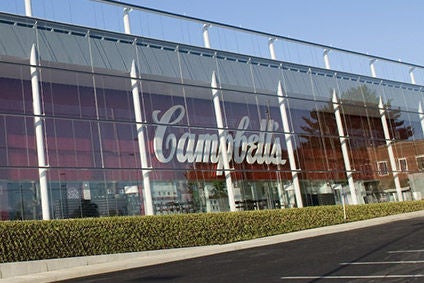
Campbell Soup Co. has identified labour issues as a new challenge to add to the inflationary environment that has emerged this year.
The Kettle chips owner was forced to turn to more expensive contract manufacturers during its fiscal third quarter, when sales dropped 11% on a reported basis to just shy of US$2bn and were down 12% in organic terms.

Discover B2B Marketing That Performs
Combine business intelligence and editorial excellence to reach engaged professionals across 36 leading media platforms.
CEO and president Mark Clouse described labour as one of the “transitional items” expected to continue to pressure Campbell’s margins into the fourth quarter. The company is preparing to increase prices from the start of its new fiscal year to offset inflation arising from higher commodities and transport costs. Campbell’s gross margin decreased to 31.7% in the three months ended on 2 May, from 34.5% in the corresponding period.
Addressing analysts yesterday (9 June) to discuss those results, Clouse said: “We have really continued to see labour as a bigger challenge than I think we had expected it to be, and of course that has a bit of a knock-on effect as that labour has not enabled us to kind of meet the full targets on production. We’ve had to go to some higher-cost co-manufacturers that we consciously invested in to make sure that supply and inventory was where we needed it.”
Campbell is not the first food manufacturer in North America to flag labour constraints. Saputo, the Canadian dairy major, last week revealed its new strategy and pointed to a concerted effort to increase automation to address the issue. “The ongoing concern of ours and many other manufacturers in this space is going to lead us to automate as many functions as we can that don’t require a dairy associate,” a Saputo executive said.
New York-listed Campbell was up against some tough comparisons to last year in its latest quarter that started at the beginning of March, given the surge in demand linked to Covid-19 that ensued around the same time a year ago.

US Tariffs are shifting - will you react or anticipate?
Don’t let policy changes catch you off guard. Stay proactive with real-time data and expert analysis.
By GlobalDataClouse described the transitional items as the “second bucket” behind the challenges around inflation.
“The second bucket I would characterise as transitional items that we are working our way through as we move out of the Covid-19 environment and fully recover on supply. This includes areas like lower fixed-cost leverage as we lap the year-ago elevated levels of demand, sustained labour challenges and added investment in higher-cost co-manufacturers to recover fully on supply.
“These transitional costs reflect about half of our gross margin erosion in the quarter and while we expect the impact of these costs to moderate into the fourth quarter, they will continue to add pressure as we fully cycle the Covid-19 environment.”
Clouse referred to third-quarter inflation as being “significant”. CFO Mick Beekhuizen quantified the impact as 290 basis points, partly reflected in the two-week closure of its plant in Paris, Texas, related to winter snowstorms, which Clouse said was an additional $10m in costs.
“Cost inflation was approximately 4% on a rate basis, which was higher than anticipated largely driven by freight rates,” Beekhuizen explained. “Partially offsetting these headwinds was our ongoing supply chain productivity programme, which contributed 150 basis points to gross margin and included initiatives among others within procurement and logistics optimisation.”
He added more “pronounced inflationary pressures” are expected to hit margins in the fourth quarter before “pricing actions take hold in the beginning of fiscal 2022″.
Clouse said the price increases will be broad-based but “mid-single-digits is probably a good assumption if you were trying to cost average it across all of our businesses”.
The CEO continued: “We currently expect the benefit from pricing actions we have put in place across our portfolio and our strong productivity plans to mitigate this inflation pressure in fiscal 2022, while we remain vigilant monitoring the ongoing dynamic nature of the current environment.
“We expect organic sales in the fourth quarter to decline versus last year as the Covid-19 lap continues. We do expect a sequential improvement from the third quarter as the comparison to the prior year eases a bit and our foodservice business continues to recover.”
Campbell provided updated full-year guidance, which reflects a more protracted decline in sales and EBIT than previously envisaged.
Net sales are expected to fall between 3% and 3.5%, compared to a previous assumption of a drop in the region of 2.5% to 3.5%. Organic sales are seen down 0.7% to 1.2%, versus the old target for a decrease around the 0.5% to 1.5% mark.
Sales in the previous financial year amounted to $8.69bn, while over the nine months of fiscal 2021 they were flat at $6.6bn and up 1% on an organic basis.
For adjusted EBIT, Campbell forecasts a much poorer performance. That metric is expected to fall 4-5%, compared to its earlier estimate of a decline of 1%, or a gain of the same magnitude.
Campbell posted EBIT of $1.44bn in 2020, and $1.13bn for the current year-to-date, up 21% in reported terms but flat organically.





